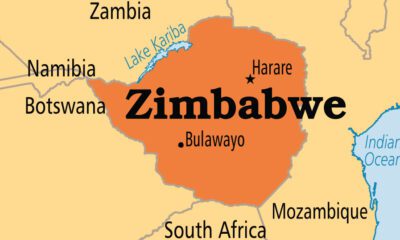National Issues
Insult as treason and other Nigerian Idi Amin Dada stories -By Festus Adedayo

Two pieces of literary works – Williams Stevenson’s thriller, Ninety Minutes at Entebbe and the film, The Last King of Scotland (2006) – plot the graph of the gradual emergence of despots. They were both x-rays of Ugandan despot, Idi Amin Dada of Uganda. Stevenson’s wasan account of the June 27, 1976 hijack of an Air France Flight 139, hijacked by terrorists and flown to the Entebbe Airport, Uganda and the July 4, 1976 reprisal codenamed Operation Thunderbolt, by a hundred Israeli commandos who, within 90 minutes, killed Ugandan guerillas and freed 103 hostages. The Entebbe crisis was one of the first indicators of the huge scandal that Idi was to the African continent. He had given the terrorists ample support, making it the first time in history that a national leader would unabashedly back terrorists.
The Last King of Scotland on its own was a historical drama adapted from a 1998 novel written by Giles Foden with the same title. Screenwriters, Peter Morgan and Jeremy Brock adapted it from a story of a Scottish medic who left Scotland to Uganda and was recruited as physician to Dada, the character of which was acted by Forest Whitaker. The film also speaks of Dada’s cruelty, how he gradually morphed into sadism due to the disposition of the Ugandan system and the machinery of state that was either too lax or too condescending to embrace a tyrant.
The world was to see more of Dada. Born in 1925 of the Kakwe tribe, northwest Uganda, though half educated, his towering height of 6 feet 4 inches egged him on. The British military in Uganda as an army of occupation at this time particularly felt intrigued by Amin’s sheer hippopotamus height and size. When he thus joined the King’s African Rifles in 1945 as an assistant cook, he rose through the ranks. He was a key force in quelling the 1952-1956 famed Mau-Mau rebellion and as he was commissioned in 1961, he garnered reputation for cruelty and bravery in equal proportion. Gradually, he began to unfold, until 1971 when he overthrew President Milton Obote and unleashed one of the cruelest regimes in African history, speculated to have murdered 300,000 Ugandans. He eliminated tribal members different from his in the army, opposition members, activists and the clergy and had a uniquely horrendous pattern of feeding his victims’ fleshes to the crocodiles in the Nile river. In 1978, however, invading Tanzanian Army stormed Uganda and Dada fled into exile in Saudi Arabia and died in 2003 of organ failure.
I went into this famous low moment of the African continent to demonstrate that despots are made by the system and not necessarily themselves. So when last Thursday, the story sieved in that the police in the Katsina home state of President Muhammadu Buhari had arrested a 70-year old man who had “insulted” Buhari and the state governor, Aminu Masari, the story of Dada sieved into my subconscious, jarring my nerves. Lawan Isa, according to the state police spokesperson, Gambo Isa, of Gafai Quarters, Katsina town, was arrested in the company of two others – Bahajaje Abu, 30, and Hamza Abubakar, 27 – having “conspired and insulted President Muhammadu Buhari and Governor Aminu Masari.” Isa said that Izala had made a “confessional statement” wherein he had given explanation of how he tongue-lashed the two Katsina-born public officials because his cows were rustled, with the shepherd who tended the cows being killed by suspected armed bandits.
In the confessional statement, he was quoted to have said: “I’m tormented with what happened in the village. While on my way back I met Bahajaje Abu (man who filmed the incident) asking me about the government, I told him that I withdrew my support because of what happened with my cows, I am now left with nothing, that is how I became emotional and started the insult.” Their arrest was said to have been ordered by the Katsina State Police Commissioner, Sanusi Buba.
Many analysts had submitted that Nigeria was too arid and hostile to despotism to allow an Idi Amin Dada to reincarnate on her soil. However, 1994 proved these pundits wrong as Nigeria minted a sadistic variant of the “Butcher of Uganda” in the goggled Sani Abacha. Journalists and opposition to his rule generally disappeared without trace and he relished inflicting pain on those who had hurt his ego. Ever since, the country has had a breather from naked despotism.
Studies of the sociology and psychology of despotism reveal that this sadism of the ruler begins to creep in when he begins to harbour a feeling of personal invincibility, becomes too egotistic and develops a skin that is easily bruised by public criticisms. While it could even be countenanced in a maximum rule like that of Abacha, despotism is an anathema to democracy and vilification of citizens for criticizing public officials is alien to the constitution. The major tenet of democratic rule is to query the efficacy or the subsistence of the claim of victory of opinion by a side. What democracy proposes is a beautiful tapestry that is woven of opinions which consist of different shapes, colors and contours. Thus, when you begin to see a democratic rule that is allergic to public criticisms, harangues holders of opinions that differ from its and preaches a monolithic viewpoint, then, as the holy writ says, know ye that autumn is nigh.
While claiming to be at home with public criticisms, Nigeria under Buhari has advertised its fascination with manacles. Last year, Abubakar Idris, known as Abu Hanifa Dadiyata, a social media personality, was said to have been abducted on Friday, August 2, by heavily armed men in the midnight as he was about to drive into his Barnawa, Kaduna residence. At about midnight, while driving into his residence at Barnawa, Dadiyata, said to be a social media influencer who was loyal to the Kwankwasiyya movement, was apprehended. He was said to be critical of the Buhari government and the All Progressives Congress (APC) government of Nasir el-Rufai. Even as his whereabouts is enveloped in nocturnes, there are claims that operatives of the Department of State Services (DSS) masterminded the Gestapo-like abduction. Whether Dadiyata is alive or had been silently butchered is yet unknown.
Cross River State’s Ben Ayade had ordered the arrest of Agba Jalingo, publisher of CrossRiverWatch, an online newspaper. He was arrested at 2pm on August 22, 2019, by men of the Federal Special Anti-Robbery Squad (FSARS) of the Nigerian police at his residence in Lagos. They were reported to have earlier invaded the Lagos bakery of his wife, Violet where, according to the reports, they “seized the phones of all staff present and ordered them to show to them Jalingo’s residence.” On August 30, Jalingo was charged with treason, terrorism, cultism and public disturbance in an Abuja Federal High Court and for “working with the #RevolutionNow movement”— brainchild of human rights activist and Publisher of Sahara Reporters, Omoyele Sowore. He was also alleged to be planning to “’undemocratically’ force the government of Ayade to end through violent means.” He had reportedly criticized Ayade of manifest corruption.
The fate of many of those who have fallen prey to the intolerance of Nigerian government, either at the state or federal level, is indescribable. They are allegedly, according to an Amnesty International report, “tortured and pressured to write confessional statements, which were used to prosecute them in court.” AI also claimed that they are slammed “indiscriminate charges such as ‘defamation’, ‘terrorism’ and ‘cyberstalking’… ‘kidnapping’, criminal trespass and theft of state documents (while) many of the journalists were prosecuted under the Cybercrime Act and Terrorism (Prevention) (Amendment) Act 2013, alongside other laws.”
While the Buhari government cleverly distances self from the tortuous paths of citizens freely expressing their views in the states and who were ostensibly suffocating under the tyranny of their state governments, citing federal bar from so doing by the constitution, it bears own fang in further cruel manner. It is interesting that when Buhari wanted to slam a lockdown on Lagos and Ogun State recently, a contravention of the tone and tenor of federalism, he didn’t think twice about it but cites same jejune provision when it comes to intervening in the release of unjustifiably imprisoned victims of his fellow Idi Amin Dadas in the states. Same last year, the Buhari government filed charges against Sowore for hatching a protest against it and “insulting” Buhari. Though no chains are around Sowore’s feet as he walks Abuja free, according to the tyrannical tone of his bail, he is clearly manacled and in jail.
The most recent victims of government’s intolerance and naked despotism are Gambo Isa, Bahajaje Abu, and Hamza Abubakar, who had the effrontery of “insulting” the Fuhrer and an Idi Amin Dada still in his diapers, Muhammadu Buhari and his minion, Masari. The police are ostensibly abetting this naked display of crude power-mongering.
If one may ask, since when did it become a crime or an offence to insult a holder of political office? For eating the people’s food free, collecting fat salaries, riding in posh cars purchased from our collective patrimony, living free in mansions that belong to the Nigerian state and for rapaciously bleeding our national purse, holders of political offices are deemed to have lost their privacy and right to be peeved by public singe of their actions. If such scrutiny is defamatory, public officials have the right to go to the court. Today, the Cybercrime Act and Terrorism (Prevention) (Amendment) Act 2013 have become fecund façade that government hides to unleash pristine and brutish intolerance on its citizens. To charge three Nigerian citizens for breach of the provisions of Cyber Crime Act, simply because they told Buhari and Masari that their alleged acts of not taking care of their interests was obtuse, a duty they both swore on oath to undertake at their swearing-in, is reminiscent of the cruelty and inhumaneness of Idi Amin Dada. Or, what do you think?










